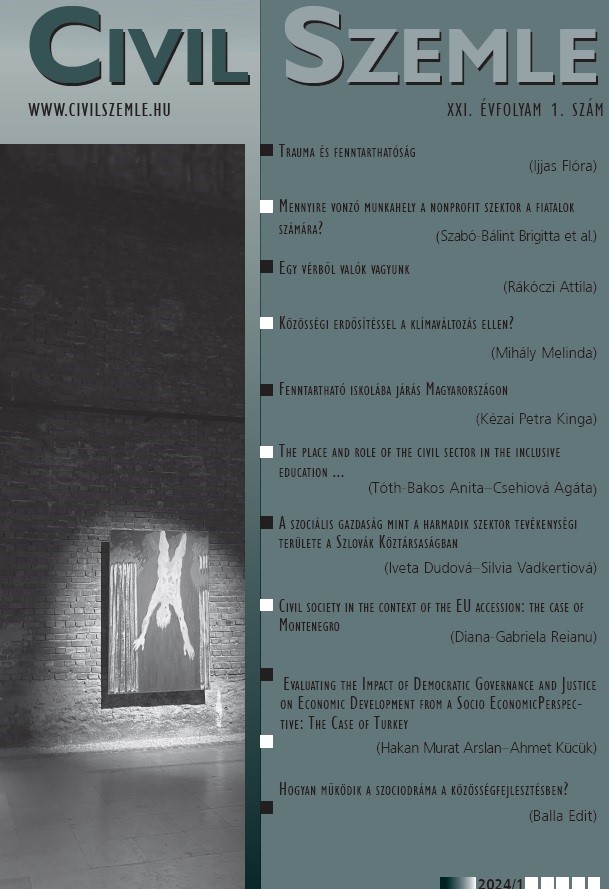A demokratikus kormányzás és az igazságosság gazdasági fejlődésre gyakorolt hatásának értékelése társadalmi-gazdasági szempontból: Törökország esete
Absztrakt
Az „İktisat (közgazdaságtan)” arab szó a „szándék” gyökből származik. A jogtudomány a „szándékot” úgy határozza meg, mint egy cselekedet tudatos végrehajtását. A közgazdaságtudomány az „İktisat” (közgazdaságtan) meghatározása szerint az ember elsődleges szükségleteinek tudatos prioritása a másodlagos vágyaival szemben. Mivel a szándék az igazságszolgáltatás igazi alapja, azt állíthatjuk, hogy ami gazdaságilag igazságos, az igazságos is. A tanulmányban a társadalmi jólétet nyújtani képes gazdasági és tisztességes közigazgatás példáit a történeti folyamatban gazdaságszociológiailag értékelték. A tanulmány fő gondolatának bizonyítására a nemzetközi demokrácia jogállamisági indexek adatait használták a szerzők. Ezzel összefüggésben az egypárti időszak, a katonai puccsok és a Törökországban a demokrácia és a jogállamiság felfüggesztésével járó memorandum időszakok pénzügyi adatait is mélyrehatóan elemezték és az ország pénzügyi szociológiai mutatóival összevetve értelmezték. A tanulmányban szó van továbbá az azokban az időszakokban bekövetkezett gazdasági változásokról is, amikor a polgári és politikai jogokat korlátozták vagy kiterjesztették. Ennek eredményeként kiderült, hogy csak a liberális értékeket, a polgári és politikai jogokat, valamint a jogállamiságot internalizáló demokratikus rezsimek vezethetik társadalmukat a gazdasági jólét eléréséhez.
Hivatkozások
Acemoglu, Daron, Johnson, Simon., & Robinson, James 2001. The colonial origins of comparative development: An empirical investigation. American economic review, 91(5): 1369-1401. DOI: 10.1257/aer.91.5.1369
Bingham, Tom 2011. The Rule of Law. Penguin Books. DOI: https://doi.org/10.1017/S1574019611300077
Cevizli, İbrahim 2013. Demokrasi ve ekonomik gelişme ilişkisi (Doctoral dissertation, Adnan Menderes Üniversitesi). DOI: http://hdl.handle.net/11607/394
Dahl, Robert A. 1971. Polyarchy: Participation and opposition. Yale University Press. DOI:10.1007/978-3-531-90400-9_24
Dawson, John W. 2003. Causality in the freedom–growth relationship. European journal of political economy, 19(3): 479-495. DOI: https://doi.org/10.1016/S0176-2680(03)00009-0
Demirer, Funda 2017. A Discussion: Bediüzzaman Said Nursi's The Treatise on Frugality. Katre Uluslararası İnsan Araştırmaları Dergisi, 3(13): 213-219. DOI: https://dergipark.org.tr/tr/pub/katre/issue/29636/318369
Diamond, Larry 1999. Developing democracy: Toward consolidation. JHU Press. DOI: https://doi.org/10.1086/316974
Doğan, Adem 2005. Demokrasi ve Ekonomik Gelişme. Erciyes Üniversitesi İktisadi ve İdari Bilimler Fakültesi Dergisi (25): 1-19. DOI: https://dergipark.org.tr/en/pub/erciyesiibd/issue/5882/77821
Doğu, Sinem 2020. Demokrasi ve ekonomik özgürlüklerin ekonomik kalkınmaya etkisi (Master's thesis, İnönü Üniversitesi/Sosyal Bilimler Enstitüsü/İktisat Ana Bilim Dalı). DOI: http://hdl.handle.net/11616/42186
Dreher, Axel, Nunnenkamp, Peter, & Thiele, Rainer 2008. Does Aid for Education Educate Children? Evidence from Panel Data. World Bank Economic Review, 22(2): 291-314. DOI: https://doi.org/10.1093/wber/lhn003
Gibbon, Edward 2020. The History of the Decline and Fall of the Roman Empire: Volume 10 (10). Jazzybee Verlag. https://dx.doi.org/10.21550/sosbilder.1123231?
Gwartney, James D., Lawson, Robert A., & Holcombe, Randall G. 1999. Economic freedom and the environment for economic growth. Journal of Institutional and Theoretical Economics (JITE)/Zeitschrift für die gesamte Staatswissenschaft, 643-663. DOI: 10.1177/2233865919846725
Hayek, Friedrich A. 1973. Law, Legislation and Liberty: A New Statement of the Liberal Principles of Justice and Political Economy. Routledge. DOI: 10.1086/292069
Kaytaz, Mehmet, Eğilmez, Mahfi, İnanç, Özlem, Şen Taşbaşı, A., & Görkey, Selda 2022. Türkiye ve Dünya Ekonomisinde Görünüm-2. DOI: https://hdl.handle.net/11729/4560
Lipset, Seymour M. 1959. Some social requisites of democracy: Economic development and political legitimacy1. American political science review, 53(1): 69-105. DOI: https://www.jstor.org/stable/1951731
North, Douglass C. 1990. Institutions, institutional change, and economic performance. Cambridge University Press. DOI: https://doi.org/10.1017/CBO9780511808678
Przeworski, Adam, Alvarez, Michael E., Cheibub, Jose A., & Limongi, Fernando 2000. Democracy and development: Political institutions and well-being in the world, 1950-1990. Cambridge University Press. DOI: https://doi.org/10.1017/CBO9780511804946
Posner, Richard A. 2010. The Problematics of Moral and Legal Theory. Harvard University Press. DOI: 10.1017/S0963180100003182
Rosenthal, Franz 1958. The Muqaddimah. An Introduction to History, 3. DOI: https://delong.typepad.com/files/muquaddimah.pdf
Sırım, Veli, & Eraslan, Mehmet 2020. Demokratikleşme ve Ekonomik Büyüme Arasındaki Etkileşim. Balkan Sosyal Bilimler Dergisi, 9(17): 119-130. DOI: https://dergipark.org.tr/tr/pub/bsbd/issue/52567/660185
Stiglitz, Joseph E., Sen, Amartya, & Fitoussi, Jean Paul 2010. Mismeasuring our Lives: Why GDP Doesn't Add Up. The New Press. http://www.tinyurl.com/y63bg5dj
Şanlısoy, Selim 2019. İnsani gelişmişlik endeksinde Türk Cumhuriyetleri örneğinde eleştirel bir yaklaşım. Uluslararası Sosyal Araştırmalar Dergisi, 12(62): 1581- 1591. DOI: Https://Www.Researchgate.Net/Publication/331409944_Insanı_Gelısmıslık_Endeksıne_Turk_Cumhurıyetlerı_Ornegınde_Elestırel_Bır Yaklasın.
Topuz, Seher G. 2022. The Relationship Between Income Inequality and Economic Growth: Are Transmission Channels Effective? Soc Indic Res 162: 1177–1231. DOI: https://doi.org/10.1007/s11205-022-02882-0
Unit, Economics Intelligent 2017. The economist intelligence unit’s democracy index. London: The Economics Intelligence Unit. DOI: https://doi.org/10.2307/1951731



